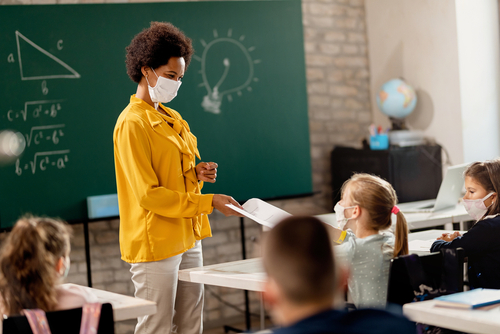A new national survey of K-12 teachers, commissioned by Global Plasma Solutions (GPS), shows that more than two-thirds are turning down or turning off portable, in-room, HEPA air purifiers (one of the most frequently deployed technologies) as a result of the noise they can generate in classrooms. Turning the portable units down or off reduces or eliminates the impact they can have on airborne pathogens and particles, potentially impacting more than 35 million students across the U.S.

According to GPS, key findings from the survey of 750 public and private school educators underscore the importance of comprehensive indoor air quality (IAQ) solutions—from increased ventilation to emerging filtration technologies—and the importance of using a range of modalities tailored to the unique needs of each local school district.
Specifically, Teachers Report the Following:
- Two-thirds (67%) of K-12 educators report being concerned about the air quality in their classrooms. Fewer than one-in-four teachers (23%) are extremely confident that the air in their classrooms is clean and safe.
- Nearly seven-in-ten (69%) of K-12 teachers in the survey turn off or turn down their in-room portable HEPA filters due to the noise they produce.
- Two-thirds (67%) of teachers often have the portable HEPA filters in their classrooms set to a level below “High” (including off)—most air cleaning systems are designed and tested with the expectation that portable air filters will run at maximum power.
- Four-in-ten (40%) of teachers surveyed say that the noise levels from in-room air filters makes it harder for them to teach or harder for their students to learn. Three-in-ten (31%) report that students ask for in-room filters to be turned off or down either daily or weekly.
“Indoor air quality is complicated, especially in high-traffic buildings like schools. Complex issues demand comprehensive solutions that work hand-in-glove with one another as part of a multi-layered approach to safely deliver cleaner air,” said Glenn Brinckman, CEO of GPS. “Portable indoor HEPA air purifiers can be part of the equation. But like any standalone technology, they are not silver bullets for solving indoor air quality. It is critical that school systems look carefully at how their systems work in real-world settings and in different kinds of school conditions to ensure that they are truly delivering the air quality results needed for their students and teachers.”
According to the U.S. Department of Education National Center for Educational Statistics, Digest of Educational Statistics, more than 60 million students and teachers are in classrooms each day throughout the school year. Many schools, particularly older ones with aging HVAC systems, have invested in portable in-room HEPA filters, among other air-cleaning technologies.
Mask and Vaccine Mandates
The survey also found there is strong teacher support for mask and vaccine mandates as well as additional technologies to improve IAQ.
- 93% of teachers indicate that they feel safer at school when a mask mandate is in place.
- 77% of teachers support implementing mask mandates for everyone entering a school.
- 76% of teachers would support school districts mandating vaccines for teachers and all other school employees.
- Three-quarters (75%) of teachers would prefer to have additional technologies that can eliminate viruses and particles.
Methodology
The survey was conducted by Group SJR on behalf of GPS. A total of 750 teachers from both public and private schools in 47 states who have portable HEPA filters in their classrooms participated in the online survey between Sept. 10-30, 2021. This included elementary (294), middle (188) and high school (268) teachers.
